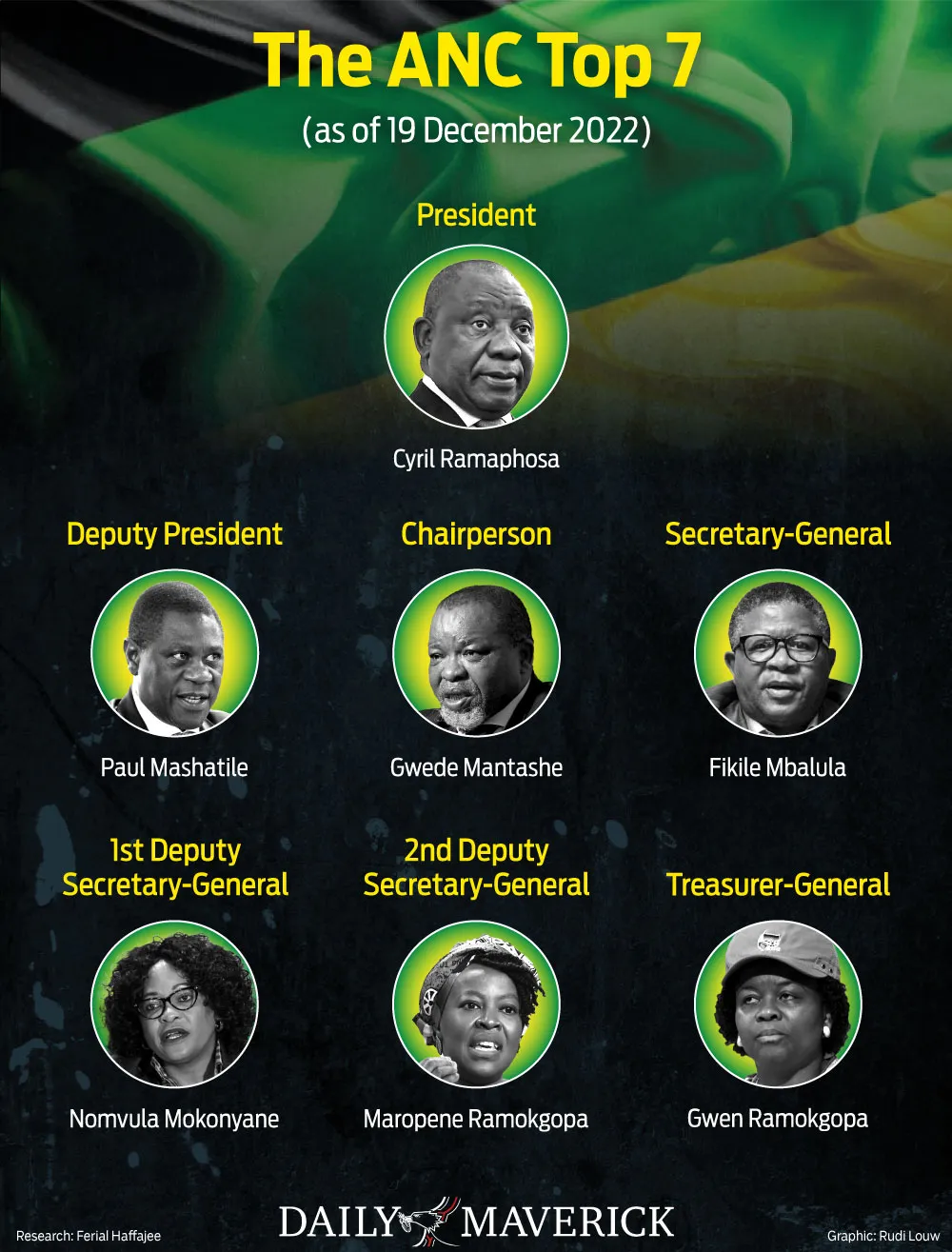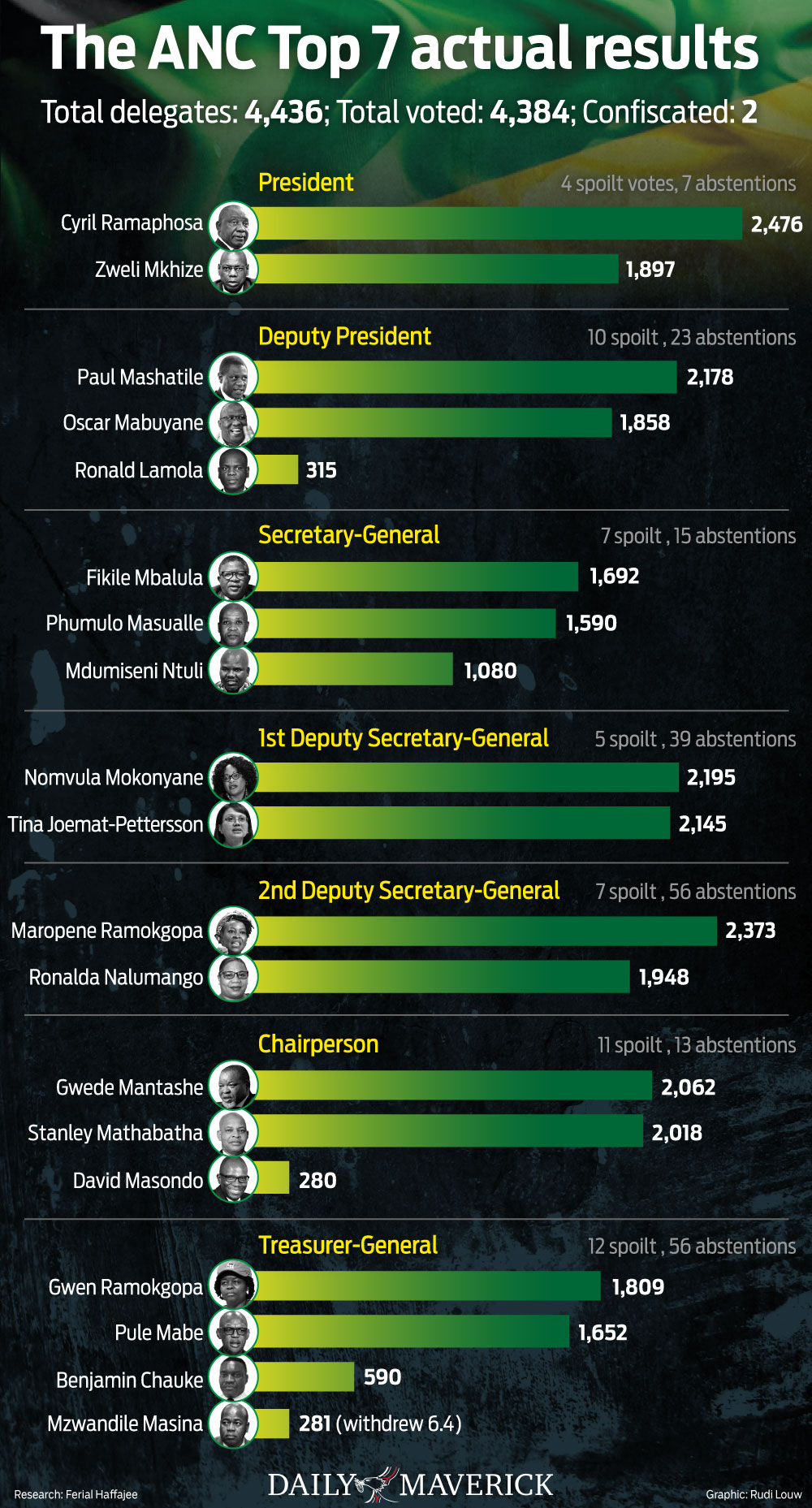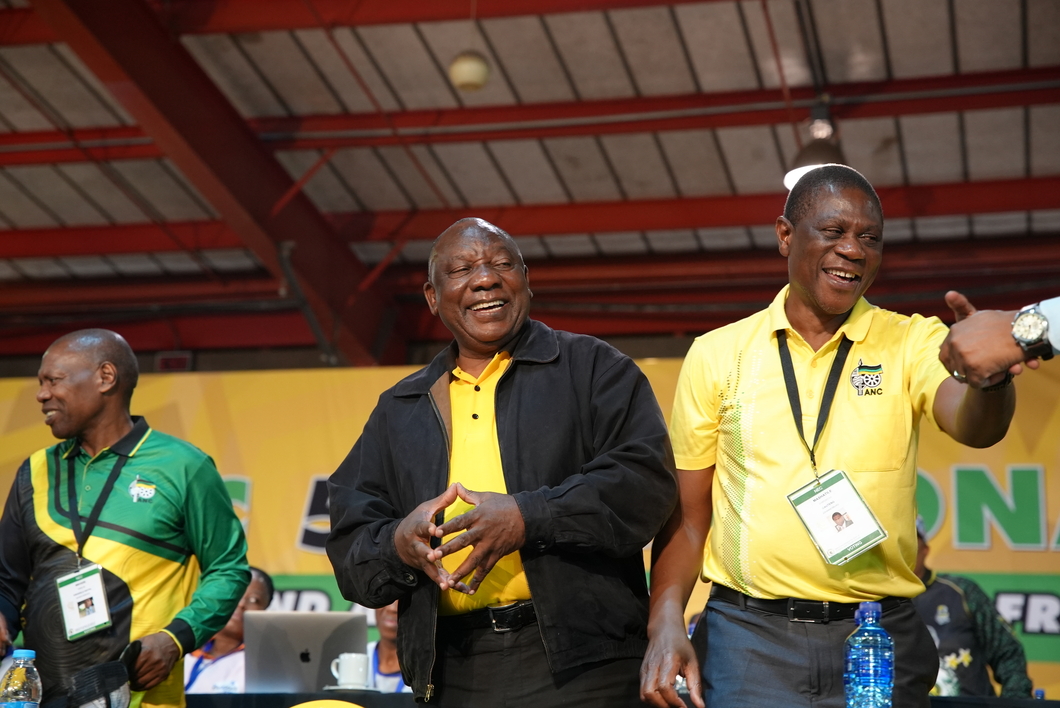In Monday’s vote announcement, President Cyril Ramaphosa’s slate secured five of the seven top ANC officials’ posts, almost a clean sweep, after terse and tense last-minute horse-trading and cajoling that was reflected in several narrow result margins.

Read more in Daily Maverick: “Relief for Ramaphosa but the wolves remain resolutely on NEC doorstep”
Effectively, that means Ramaphosa remains in Luthuli House and the Union Buildings, set to steer a governing party that’s admitted to being in an existential crisis and in decline. Or as the organisational report put it: “We must acknowledge that the ANC is experiencing a crisis threatening its existence. We cannot expect to achieve any of our goals and regain the people’s trust if we fail to take the necessary actions.”
The organisational report bluntly talks of the ANC’s falling electoral support, how “disunity and factionalism remain rampant” amid inadequate party functioning. “We are at a crossroads,” said the report.
Such blunt statements from an organisation whose membership has dropped to 661,489 from just over a million members in its 2012 centenary year, come against recent research that put Ramaphosa’s public trust levels, in the mid-30 percentages, at between 10 to 15 percentage points higher than the governing ANC he leads.
But Ramaphosa’s clean governance push was damaged by a Section 89 independent panel recommendation that he had an impeachment case to answer over his Phala Phala farm forex scandal. While probes by the Public Protector, Hawks, the tax authorities and South African Reserve Bank are ongoing, ANC MPs used their numbers to kill off any further parliamentary steps for Ramaphosa’s removal from office.
Read more in Daily Maverick: “Phala Phala, Parliament, Eskom: Ruling party is closing ranks again, playing ANC vs Everyone Else”
However, Cooperative Governance Minister Nkosazana Dlamini Zuma voted for starting an impeachment inquiry, while absent for that vote was Tourism Minister Lindiwe Sisulu, who’s also been sharply critical of the President.
A Cabinet reshuffle
Segue to the first hurdle Ramaphosa faces — a Cabinet reshuffle, possibly as early as January, on the back of a strengthened political hand following his re-election.
It’s tricky timing amid a confluence of factors, including recompense for faithful organising and electoral regimen. It will test Ramaphosa’s political nous and backbone.
Both Sisulu and Dlamini Zuma are to be dropped, according to speculation. Two other vacancies exist: the public service and administration ministry that’s not had a political boss since Ayanda Dlodlo left for the World Bank; and the transport ministry, where Fikile Mbalula’s resignation is pending as his ANC secretary-general role is a full-time position.
That could happen at February’s State of the Nation Address, or on Monday, according to Mbalula in a televised briefing about the ANC elective conference on Monday evening.
Further executive vacancies may arise from shifting out deputy ministers such as Deputy Public Enterprises Minister Phumulo Masualle, who stood on the Mkhize slate.
Mashatile and Mabuyane
Eastern Cape Premier Oscar Mabuyane would have to be accommodated in Cabinet in one of the many consequences of deals and horse-trading that must unfold. Mabuyane, a Ramaphosa ally, got 1,858 votes against 2,018 for ex-treasurer Paul Mashatile, and failed to become party deputy president.

Mashatile’s wish to move into government was clearly expressed by the now ANC deputy president to Bloomberg, where he said: “If I am deputy president of the ANC I think it will be better to go and assist in government”.
But Mashatile is not an MP. And according to section 91(3)(a) of the Constitution, “The president must select the deputy president from among the members of the National Assembly.”
Not applicable is the possibility of two Cabinet posts filled from outside Parliament, currently held by Trade and Industry Minister Ebrahim Patel and Finance Minister Enoch Godongwana.
So Ramaphosa must wait — until May 2023 when the electoral regimen allows the amendment of public representatives lists, to get Mashatile on those after a vacancy is created by resignation, and then manoeuvre a vacancy on the ANC benches in Parliament for Mashatile to take up a seat there.
This timeframe, alongside Mbalula’s comments, signals flexible timing for a Cabinet reshuffle, and possibly even another step towards the reorganisation of the state, including downscaling, which Ramaphosa talked of when elected by MPs as President in February 2018.
Mabuza conundrum
Exactly how incumbent Deputy President David “DD” Mabuza would agree to resign, or be shuffled out, is another conundrum for Ramaphosa. But at the ANC national elective conference, Mabuza did turn down a nomination from the floor, perhaps signalling his readiness for a political move.
Much of the five-day ANC elective conference was taken up with voting and related matters — from a messy delegates’ registration process that delayed the start, and voting, plus eleventh-hour backroom wheeling and dealing.
The narrow margins in some of the official elections are a sign of this, and some rather strange strategies that saw two candidates linked to the Ramaphosa side split the vote in the polls for deputy presidency, secretary-general and national chairperson.
NEC obstacles
With an overwhelming number of candidates for the 80-strong ANC National Executive Committee (NEC) not Ramaphosa-friendly, the balance of power in the highest decision-making structure between conferences may not necessarily allow Ramaphosa to make the moves he’d like.
The noise, contestation and, yes, disunity are set to continue. Not just in the ANC, but also in the government structures it controls.
Some of that seemed to emerge on Monday, with the grapevine indicating the economic transformation commission discussions had agreed to shift troubled Eskom, wracked by almost persistent rolling power outages, from the Department of Public Enterprises to the Department of Mineral Resources.
That’s headed by Mantashe, who over the past three weeks went to battle for Ramaphosa in a series of deals that secured the President’s stay and ultimately his election for a second term as party president.
While the policy debating commissions had completed their business on Sunday night, reports were still before adoption in plenary. The resolutions are expected to be published on Tuesday, when the ANC said the conference would close.
The old is making way for the new. The question that remains, however, is: how much actually has changed? DM





